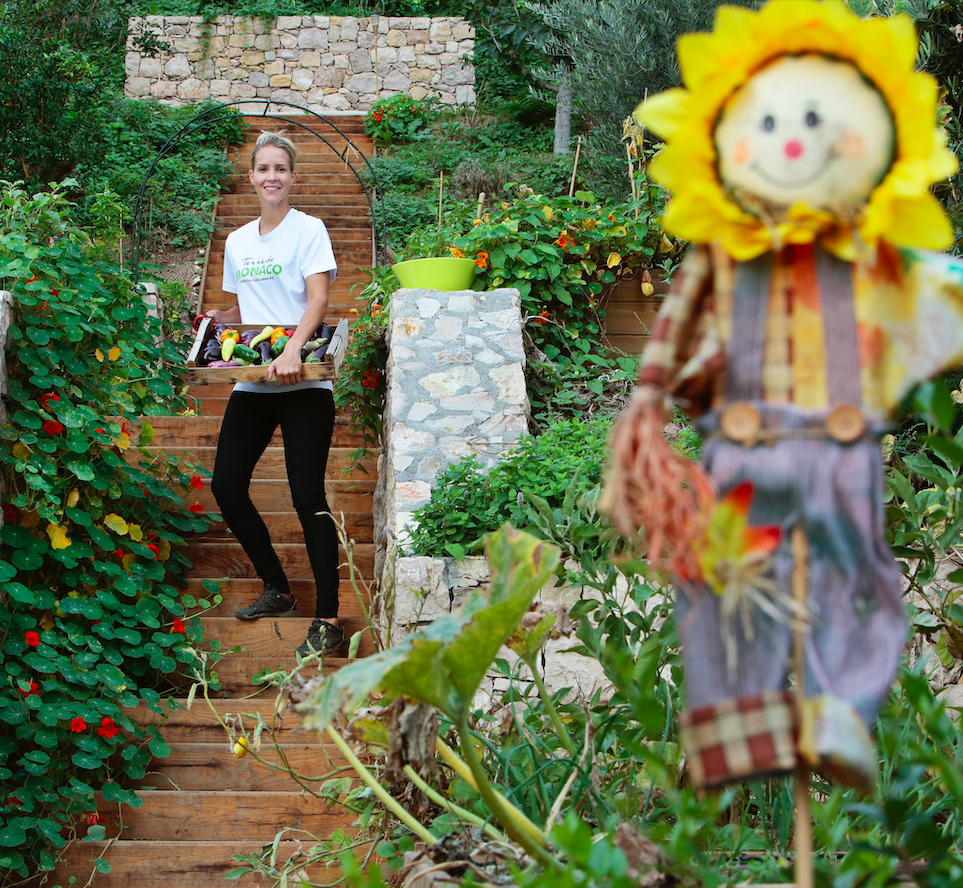The last thing you’d expect to find in Monaco is a chicken. A live one, mind — and not a fancy Michelin-starred bird presented on a porcelain plate. But that’s exactly what you’d discover on a rooftop next to Monaco’s tallest skyscraper: 60 plump chickens traipsing about a thriving, verdant garden.
It’s not the only green space that’s popping up in space-starved Monaco. Since 2016, social enterprise Terre de Monaco has set up over 1600 square meters — about one and a half Olympic-size pools — of rooftop terraces and gardens across the principality. They produce vegetables — including courgettes, aubergines, and 40 different varieties of tomatoes — and have an apiary of 10 beehives to accompany their sizeable flock of chickens, much to the amusement of nearby residents.
“I’m proud of my chickens. They live with a sea view below one of the most expensive apartments in the world,” laughs Terre de Monaco founder Jessica Sbaraglia.
The urban farming initiative has even found some royal fans. Sbaraglia’s first urban garden under the project — a 30 square meter plot — continues to thrive within the grounds of reigning monarch Prince Albert II’s Foundation.
With 80 percent of the city’s surface covered by buildings and modern landscape, Monaco makes for the perfect candidate for urban farming; as Sbaraglia explains, she first got the idea when she looked out her window and saw swathes of barren rooftops across the city.
“I lived on the hills near the Princes Grace Hospital, and looking down, I’d see all the flat and empty roofs of the Fontvieille district,” she says.
At the time, Sbaraglia was caring for her own balcony garden. If she could carve out a small space of green in such cramped quarters, thought Sbaraglia, surely more could be done with an entire rooftop.
“So for two years I trained myself as a gardener in different farms — I learned to put together vegetables that complement each other, to promote diversity and balance in a garden, to keep the earth alive and healthy — all without using pesticides,” she says. “I also learned to integrate beehives, because bees help to naturally maintain this ecosystem and biodiversity.”
Today Terre de Monaco runs gardens atop some of Monaco’s ritziest addresses: on the low roof of the Monte-Carlo Bay Hotel & Resort is a 400 square meter garden that overlooks the azure sea — it even supplies the hotels’ Michelin-starred restaurant with select produce.
Sbaraglia’s urban farming project has since evolved beyond just a casual hobby. Terre de Monaco maintains vegetable gardens in six schools around the city, where they teach children how to grow their own produce, and to appreciate where their food comes from.
They also have a vegetable garden at the Princess Grace Hospital, near Sbaraglia’s former home, whose view inspired the Terre de Monaco initiative. There, patients are encouraged to tend to the gardens if they wish — or just go for a leisurely stroll through them.
“We work with the psychiatric department of the hospitals, including patients who suffer from certain conditions like schizophrenia, anorexia, bulimia,” says Sbaraglia, who adds that the programme that has generated “a lot of positive feedback”.
“The fact that they can taste the salad that they’ve planted and harvested themselves is a source of satisfaction for these people,” she adds.
As for where the harvest goes? The produce is sold directly on-site: for example, vegetables and chicken eggs from the Odeon Tower plot go straight to residents. Often, demand far outstrips supply.
Sbaraglia says she wants to expand the initiative to other countries. She’s set to launch ‘Terre de Nice’ in the neighbouring French city — this time with rooftop bridges to link the different gardens — and is working on plans for an even larger project in Belgium, which is slated to have a greenhouse, a compost unit, and a wellness centre.
She’s even keen on the idea of bringing the project to Singapore, which she says shares many similarities with Monaco, in that both are highly-urbanised cities with a penchant for sustainable development. She says: “What better way to bring together city-states like Monaco and Singapore than with a project to protect the environment? People will benefit from nature in many ways, especially in urban cities.”







